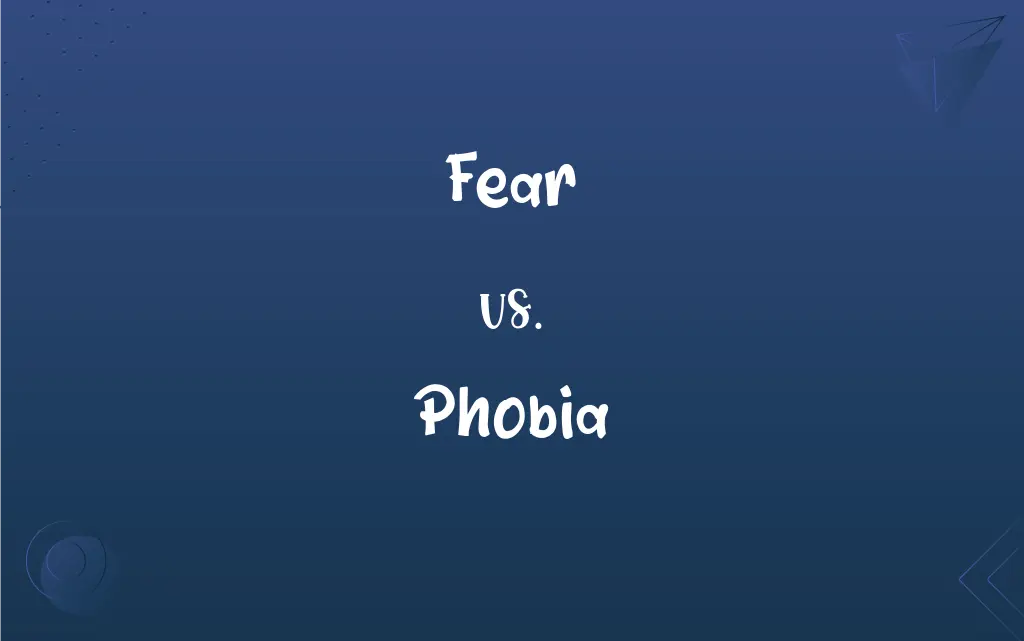Fear vs. Phobia: What's the Difference?
Edited by Aimie Carlson || By Harlon Moss || Updated on October 23, 2023
Fear is a natural, emotional response to a perceived threat, while phobia is an intense, irrational fear of specific situations, objects, or activities.

Key Differences
Fear is a primal emotion that humans and animals experience in response to real or perceived threats. It is evolutionary and has helped organisms survive by alerting them to potential dangers, prompting a fight or flight reaction. Fear can be immediate or linked to something that might happen in the future. It can be fleeting, and once the threat is gone, so typically is the fear.
Phobia, on the other hand, transcends this primal emotion. It's an amplified and persistent fear of specific situations, objects, or activities, often out of proportion to the actual threat. Unlike general fear, phobias can disrupt daily life, causing individuals to go to great lengths to avoid the feared object or situation. The origin of a phobia might not always be known, and it can persist even when individuals recognize their fear as being irrational.
While fear serves a protective role, guiding behavior based on real dangers, phobias often stem from anxieties that aren't grounded in realistic harm. For instance, feeling fear when faced with a wild animal is a natural survival mechanism, but avoiding all dogs due to an extreme, irrational fear, even friendly ones, can be classified as a phobia.
Phobia is more than just an exaggerated fear. It's a type of anxiety disorder that can elicit severe reactions. While some fears fade as individuals grow or gain experience, phobias can remain stagnant or even intensify over time. Therapy, counseling, and medication are often sought to help individuals manage or overcome their phobias.
In essence, while fear and phobia both relate to distressing emotions experienced towards threats, the former is more transient and adaptable, whereas the latter is persistent, often irrational, and can significantly impede regular activities.
ADVERTISEMENT
Comparison Chart
Nature
Natural emotional response
Intense, irrational fear
Duration
Typically transient
Persistent
Response to Actual Threat
Based on real or perceived immediate threats
Often disproportionate to the actual threat
Interference with Daily Life
Can be temporary based on the situation
Often disrupts daily activities and routines
Treatment
Typically not required unless chronic or debilitating
May require therapy, counseling, or medication
ADVERTISEMENT
Fear and Phobia Definitions
Fear
A concern or apprehension.
Parents often have fears for their children's safety.
Phobia
An anxiety disorder characterized by an intense fear.
After the traumatic event, she developed a phobia of driving.
Fear
A feeling of anxiety about a potential event.
He expressed his fear of losing the job.
Phobia
A persistent dread often not based on realistic dangers.
Despite knowing its safety, his phobia of elevators made him always take the stairs.
Fear
An unpleasant emotion caused by a perceived threat.
The sudden noise in the dark room filled her with fear.
Phobia
An extreme or irrational fear of specific situations or objects.
She has a phobia of spiders, making camping difficult for her.
Fear
A reverence or respect towards something powerful.
She spoke with a fear of the law.
Phobia
A strong aversion or dislike.
His phobia of public speaking hindered his career advancement.
Fear
An anticipation of possible danger.
Fear gripped the town after the series of mysterious incidents.
Phobia
An obsessive and irrational avoidance of certain situations.
Her phobia of germs caused her to avoid public places.
Fear
A very unpleasant or disturbing feeling caused by the presence or imminence of danger
Our fears intensified as the storm approached.
Phobia
A persistent, abnormal, and irrational fear of a specific thing or situation that compels one to avoid it, despite the awareness and reassurance that it is not dangerous.
Phobia
A strong fear, dislike, or aversion.
Phobia
An irrational, abnormal, or obsessive fear (of something).
I know someone with a strange phobia of ladders.
Phobia
An aversion or dislike (of something).
Phobia
An anxiety disorder characterized by extreme and irrational fear of simple things or social situations;
Phobic disorder is a general term for all phobias
FAQs
What is the primary distinction between fear and phobia?
Fear is a natural response to threats, while phobia is an intense, irrational fear of specific things or situations.
Are phobias treatable?
Yes, therapies and treatments exist to help manage or overcome phobias.
How common are phobias?
Phobias are common, with millions experiencing different types of phobias.
Do phobias only focus on tangible things?
No, phobias can be related to situations, spaces, or abstract concepts.
Can you be born with a phobia?
Phobias typically develop over time, but some people might be more predisposed due to genetics or environment.
How does one confront a fear or phobia?
Gradual exposure, therapy, and counseling are common methods to confront and manage fears and phobias.
Can fears lead to phobias?
Yes, unresolved or intense fears can potentially develop into phobias.
Can you have multiple phobias?
Yes, an individual can have more than one phobia.
Is fear learned or innate?
Both. Some fears are instinctual, while others can be learned through experiences.
Why do some people have phobias of harmless things?
The origin of phobias can be complex and might not always relate to actual harm.
Does everyone experience fear in the same way?
No, the experience and expression of fear can vary among individuals.
Can a traumatic event cause fear to become a phobia?
Yes, traumatic experiences can intensify fears, potentially leading to phobias.
Is fear always negative?
No, fear can be protective, helping individuals react to threats.
Are children more susceptible to fears?
Children often have fears, but they can outgrow many of them as they age.
Can animals have phobias?
Yes, animals can also exhibit behavior indicating specific fears or phobias.
Do phobias ever go away on their own?
Some might diminish over time, but many persist and may require intervention.
Are phobias based on past traumas?
While not always, some phobias can originate from traumatic events.
Can fear be beneficial?
Yes, fear can be a protective mechanism, signaling danger and promoting survival.
How do you differentiate between a fear and a phobia?
Phobias are usually more intense, persistent, and disruptive than fears.
Are there specific triggers for phobias?
Yes, each phobia typically has specific triggers, though the severity can vary.
About Author
Written by
Harlon MossHarlon is a seasoned quality moderator and accomplished content writer for Difference Wiki. An alumnus of the prestigious University of California, he earned his degree in Computer Science. Leveraging his academic background, Harlon brings a meticulous and informed perspective to his work, ensuring content accuracy and excellence.
Edited by
Aimie CarlsonAimie Carlson, holding a master's degree in English literature, is a fervent English language enthusiast. She lends her writing talents to Difference Wiki, a prominent website that specializes in comparisons, offering readers insightful analyses that both captivate and inform.































































